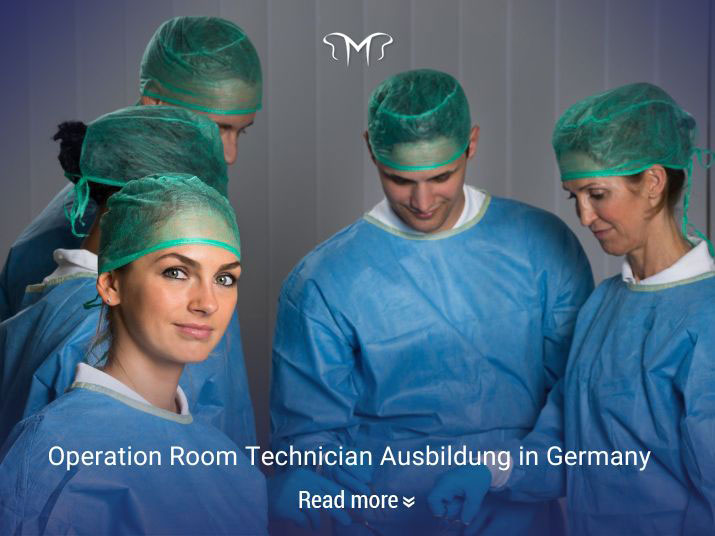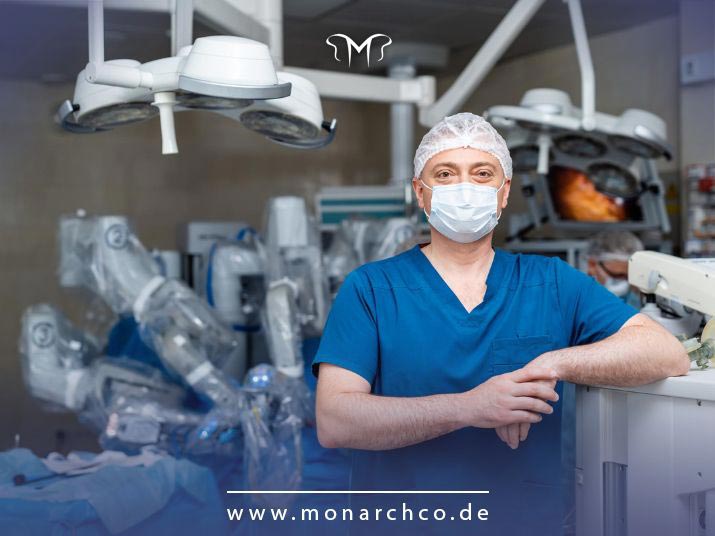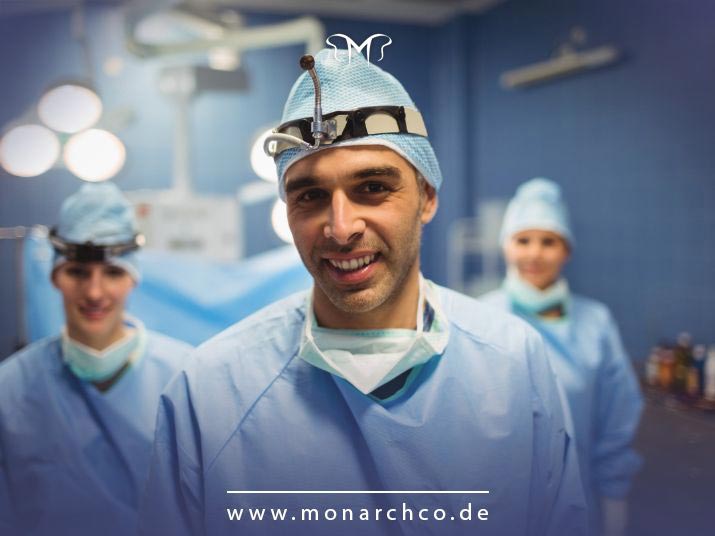
Everything You Need to Know About the Operation Room Technician Ausbildung in Germany
One of the most popular vocational training programs in Europe is the Operation Room Technician Ausbildung in Germany, which not only offers a fascinating career path but also ensures a promising job outlook. Given the increasing demand for healthcare professionals in Germany and the rising number of applicants for Operation Room Technician Ausbildung, this article from the Monarch website provides a comprehensive guide on this subject.
Germany, as one of the leading countries in healthcare and medicine, offers exceptional opportunities for those seeking education and employment in this field. The Operation Room Technician Ausbildung in Germany is a practical training program that equips students with the necessary skills to work in hospital operating rooms. This course includes learning advanced techniques, safety and hygiene protocols, and communication skills essential for providing the best care to patients. In the following sections, we’ll delve deeper into the requirements for the program and the responsibilities associated with this profession.
Role of an Operating Room Technician in Germany
The Operating Room Technician in Germany is one of the most critical and essential members of the healthcare team, directly impacting the survival and well-being of patients. This role involves a wide range of responsibilities that significantly contribute to the success of surgical procedures.
Operating room technicians in German hospitals play a pivotal role in various stages of surgery, including preparing the operating room, sterilizing tools and equipment, and arranging them in an organized manner. Given the importance of adhering to hygiene and safety standards in the operating room, these professionals must work with precision and attention to detail to minimize the risk of infections and other complications.
During surgeries, those trained as surgical technicians in Germany assist the surgeon and other medical team members by promptly providing instruments and ensuring the smooth progression of the procedure. This close and efficient collaboration allows the surgeon to maintain focus on the operation and monitor the patient’s condition.
Technicians must also be familiar with a wide range of surgical equipment and techniques to respond quickly in emergencies and ensure patient safety. The Ausbildung for Operating Room Technicians in Germany is specifically designed to train and prepare these professionals, equipping them with the skills and knowledge needed to support Germany’s healthcare system with highly qualified and effective personnel.

Entry Requirements for Becoming an Operating Room Technician in Germany
If you plan to enroll in the Operation Room Technician Ausbildung in Germany and work as a surgical technician in the German healthcare system, you must meet specific requirements in addition to being familiar with the duties of the role. The most crucial prerequisite is responsibility and genuine interest in the profession. Other requirements, similar to those for radiology Ausbildung in Germany, include:
-
Certificate of Good Conduct: Some hospitals and medical centers may require a certificate of good conduct to ensure you are suitable for the role.
-
Practical Skills: You should demonstrate practical abilities, including handling surgical tools and equipment under high-pressure situations.
-
Physical Stamina: The ability to stand and work for long periods and endure physically and mentally demanding conditions is essential.
-
Motivation and Passion for Healthcare: A strong desire to work in healthcare and assist patients is a key prerequisite.
-
Continuous Learning: Technicians must regularly update their knowledge and skills by attending specialized training programs and workshops.
-
Teamwork and Collaboration: As part of a closely connected healthcare system in Germany, operating room technicians need to work seamlessly with surgeons, nurses, and other medical staff.
Responsibilities of an Operating Room Technician in Germany
Operating room technicians in Germany carry out a range of critical responsibilities that ensure successful surgeries and patient safety. Below are some of their key duties:
-
Ensuring Equipment Sterilization: Ensuring all surgical tools and equipment are completely sterilized and ready for use.
-
Arranging Surgical Tools: Organizing surgical instruments and equipment based on the type of operation and the surgeon’s needs.
-
Assisting During Surgery: Handing instruments and equipment to the surgeon promptly during the operation.
-
Monitoring Patient Conditions: Keeping track of the patient’s needs and ensuring all medical requirements are met during surgery.
-
Adhering to Safety Protocols: Maintaining safety and hygiene in the operating room, including wearing protective clothing and equipment.
-
Maintaining Equipment Functionality: Ensuring all medical devices are working correctly and arranging for repairs when needed.
-
Using Management Tools: Operating tools or software to document and manage patient and surgical information.
-
Effective Communication: Coordinating effectively with the surgical team for better outcomes during procedures.
-
Surgical Documentation: Recording surgery details and patient conditions for post-operative reviews.
-
Ongoing Training: Participating in specialized training and workshops to update skills and knowledge.
-
Training New Technicians: Teaching and mentoring new operating room technicians or students when necessary.
-
Post-Surgery Support: Collaborating with nurses to monitor the patient’s recovery process and manage pain.
-
Reporting Outcomes: Preparing reports on surgery results and patient status.
These duties reflect the diverse and essential roles operating room technicians play in ensuring surgical success and patient care in Germany.

Duration of the Operating Room Technician Ausbildung in Germany
If you look at the list of Ausbildung programs in Germany, you’ll notice that the Operating Room Technician Ausbildung typically lasts about three years. This training program combines classroom lessons, practical internships, and hands-on experience in operating rooms. In addition to academic coursework, participants receive training in hospitals and medical centers, where they gain exposure to various surgical environments and acquire the skills needed for their roles.
During the three-year program, students are trained in subjects such as:
-
Anatomy and Physiology Basics
-
Surgical Techniques
-
Patient Safety
-
Medical Equipment Management
The curriculum also emphasizes communication and teamwork skills, ensuring that operating room technicians can effectively collaborate with other medical professionals in German hospitals. Participants learn sterilization methods, pre- and post-operative patient care, and how to use surgical tools and equipment. By the end of the program, trainees are well-prepared to work confidently and professionally in challenging medical environments.
Salary and Income of Operating Room Technicians in Germany
Operating room technicians are among the highest-paid professions in Germany's Ausbildung programs. The income and salary of an operating room technician in Germany depend on factors such as experience, workplace, and hospital type.
-
Starting Salary: Newly trained technicians typically earn between €35,000 and €40,000 per year.
-
Experienced Technicians: With experience and skill development, this figure can rise to €45,000 to €60,000 per year.
In private hospitals and prestigious medical centers, salaries can exceed these figures, especially for technicians specializing in certain types of surgeries.
Factors Affecting Salary:
-
Type of Institution:
-
Public hospitals generally offer standardized salaries based on collective agreements.
-
Private hospitals often provide higher salaries.
-
Geographic Location:
-
Cities like Berlin or Munich typically offer higher salaries compared to rural areas.
-
Experience and Specialization:
-
Technicians with specialized expertise or significant experience are more likely to earn higher wages.
Additional Benefits:
In addition to the base salary, operating room technicians in Germany often receive:
-
Health Insurance
-
Housing Allowances
-
Free Training and Workshops
Some professionals also earn bonuses for working night shifts or during holidays, contributing to an attractive overall income package and enhancing their job satisfaction.

Career Opportunities for Operating Room Technicians in Germany
The Operating Room Technician Ausbildung is a popular and promising career path in Germany, offering numerous job opportunities for those interested in the field. Below are some potential career paths for trained professionals:
1. Working in Hospitals
After completing their Ausbildung, technicians can work as integral members of surgical teams in hospitals. Their responsibilities include preparing operating rooms, sterilizing tools and equipment, and assisting surgeons during operations.
2. Employment in Private Clinics
Graduates with a technician certification can also work in private surgical clinics. These facilities often focus on specialized surgeries, requiring skilled technicians capable of operating in advanced environments. Working in private clinics allows technicians to develop expertise in specific fields and enhance their clinical skills through closer patient interaction.
3. Teaching and Training
Experienced operating room technicians can become instructors or trainers in educational institutions. They can pass on their knowledge and experience to new students and future professionals in this field, contributing to the development of the next generation of healthcare workers.
4. Research Centers
Operating room technicians may also find opportunities in research centers, participating in projects related to surgery and healthcare. This type of work allows technicians to contribute to advancements in medical science and the development of innovative treatment methods.

Future Prospects for Operating Room Technicians in Germany
The future for operating room technicians in Germany looks bright due to the country’s growing demand for surgical and healthcare services. With an aging population and increasing surgical needs, the demand for skilled surgical teams, including operating room technicians, continues to rise.
It’s anticipated that job opportunities in this field will increase significantly in the coming years, particularly in hospitals and private surgical centers.

Read more: The future of the Nursing Profession in Germany
Career Advancement
Technicians also have the chance to advance their careers by specializing in areas such as cardiac surgery, orthopedic surgery, or cosmetic surgery. Specializing in these fields not only increases income but also enhances job satisfaction and overall quality of life.
Given the growing demand for medical professionals, many technicians, like nurses migrating to Germany, are expected to choose this country as a prime destination for career development.
Final Thoughts
The Operating Room Technician Ausbildung in Germany is a dynamic and prestigious training program designed to prepare skilled professionals in surgical and healthcare settings. This three-year course includes theoretical education and practical training, enabling graduates to work in hospitals, private clinics, and educational institutions.
With the ever-increasing need for specialized medical services in Germany, the job outlook for this field is very promising. The Ausbildung offers ample opportunities for skill development, career growth, and financial stability. If you're considering a lucrative and fulfilling profession in healthcare, this might be the perfect path for you.
For more information on nurse migration to Germany or guidance on career and employment opportunities, contact a trusted migration service provider, like Monarch, to help you achieve your career goals.
FAQs
What are the responsibilities of an operating room technician in Germany?
Operating room technicians are responsible for preparing operating rooms, sterilizing tools, assisting surgeons during operations, monitoring patients, and providing post-operative care.
What are the requirements for entering the Ausbildung for operating room technicians?
Applicants need a high school diploma, a B2-level German language certificate, a medical fitness certificate, and potentially a police clearance certificate.
What is the job outlook for operating room technicians in Germany?
The job outlook is highly favorable, with numerous opportunities in hospitals, private clinics, and research centers, reflecting Germany’s growing need for medical professionals.


